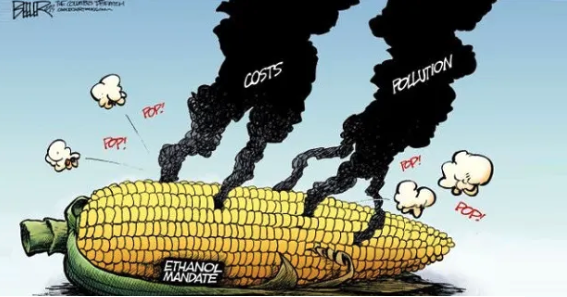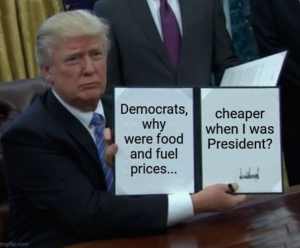- Radical farm state idea — cropland for food, gasoline for cars

Related reading: https://news.algaeworld.org/2016/08/blunder-biofuel-mandate/
Big Ethanol has wrapped itself in a cloak of environmentalism for decades, winning government mandates for the marketing and use of its product — they are finally being defrocked, certainly their cover is in taters, and objective environmentalists are now joining the fraying.
Bought and paid for, and sheepish politicians have sustained Big Ethanol using the same cloak. Too many Republican voters in farm states operate on a presumption that ethanol is a political or economic necessity. Farm state media pretty much either can’t see beyond its advertisers, or as hidebound liberal as they are, are still devoted to the propaganda they bought into and in general can’t let go of the falsities or environmental boondoggles they helped foster.
Green studies warning about corn for ethanol were published six years ago. (or longer)
And so we ask
Will there be objective coverage of this article from the Proceedings of the National Academy of Sciences (PNAS)? (excerpts)
Environmental outcomes of the US Renewable Fuel Standard.
Significance
Biofuels are included in many proposed strategies to reduce anthropogenic greenhouse gas emissions and limit the magnitude of global warming. The US Renewable Fuel Standard is the world’s largest existing biofuel program, yet despite its prominence, there has been limited empirical assessment of the program’s environmental outcomes. Even without considering likely international land use effects, we find that the production of corn-based ethanol in the United States has failed to meet the policy’s own greenhouse gas emissions targets and negatively affected water quality, the area of land used for conservation, and other ecosystem processes. Our findings suggest that profound advances in technology and policy are still needed to achieve the intended environmental benefits of biofuel production and use.
Abstract
The Renewable Fuel Standard (RFS) specifies the use of biofuels in the United States and thereby guides nearly half of all global biofuel production, yet outcomes of this keystone climate and environmental regulation remain unclear. Here we combine econometric analyses, land use observations, and biophysical models to estimate the realized effects of the RFS in aggregate and down to the scale of individual agricultural fields across the United States. We find that the RFS increased corn prices by 30% and the prices of other crops by 20%, which, in turn, expanded US corn cultivation by 2.8 Mha (8.7%) and total cropland by 2.1 Mha (2.4%) in the years following policy enactment (2008 to 2016). These changes increased annual nationwide fertilizer use by 3 to 8%, increased water quality degradants by 3 to 5%, and caused enough domestic land use change emissions such that the carbon intensity of corn ethanol produced under the RFS is no less than gasoline and likely at least 24% higher. These tradeoffs must be weighed alongside the benefits of biofuels as decision-makers consider the future of renewable energy policies and the potential for fuels like corn ethanol to meet climate mitigation goals.
(first paragraph)
Bioenergy is an essential component of most proposed pathways to reduce anthropogenic greenhouse gas (GHG) emissions and limit global warming to 1.5 or 2 °C by middle to late century (1⇓⇓⇓⇓–6). Liquid biofuels may contribute to bioenergy’s share of climate mitigation by displacing petroleum-based fuels with those generated from modern-day plants (7, 8). The GHG benefits of such substitution, however, are dependent on several factors including whether biofuel production invokes additional plant growth (9⇓⇓–12), the extent to which combusted plants (typically crops) are replaced in the food system (13⇓–15), and the degree to which biofuel production directly and indirectly alters patterns of land use and management (2, 16⇓⇓⇓–20). Because land use changes (LUCs) and other consequences induced by biofuels have the potential to cause significant novel GHG emissions and modify other ecosystem services and disservices (21⇓⇓⇓⇓–26), accurately estimating and accounting these outcomes is critical for the formation of effective climate and environmental policy (27⇓–29).
To be sure the article is no condemnation of the concept of liquid biofuels, more the sequelae of the policy drivers decided by politicians. Politicians (and much of the so-called green movement) have failed to foresee consequences, or disregard them in doctrinaire manner or they foster the law of concentrated gain (for biofuel interests and political coffers) and defuse pain (taxpayers).
Big Ethanol will probably just tut tut about the article disregarding the prestigious source and say more incentives (tax money) and regulations they write will solve any problems BUT FOR GOD SAKES THE SKY WILL FALL IF 40+% OF THE CORN CROP IS NOT CREATED FOR AND INEFFICIENTLY STUFFED IN GAS TANKS. They will never honestly pursue an end to the mandates or the use of grade A farmland to create ethanol. But honest environmentalists are beginning to recognize that Big Ethanol does not really care as much as they do about the environment (never did) it was always mostly opportunism.
But individual farmers ought to care about food prices (they see them and pay them as well and realize that the prices are not necessarily reflective of their income, more their costs, and that those are artificially high. We want them to prosper for their investments and toils but isn’t there a better use for their land than ethanol?
As human beings proud that what they produce is feeding the nation they at least ought not to favor ethanol production over other uses for their cropland. Ethanol producers can pound sand if farmers have full production alternatives to them. Accordingly what if a better regime of agriculture policy (hopefully more market based as that is the great adaptor to needs) is developed — something else to help insure their wholeness at least as well, and for better purpose than ethanol for cars?
We accept that agriculture is a special case in that human needs including national security cannot be left to farmers sinking or swimming — to broad natural events or world markets. The efficiency and abundance we have grown use to requires substantial timely investment by farmers which has to be covered in prices. World markets have too many variables impacting national security to be relied on for food security at affordable prices.
 While world markets are a not to be abandoned price leveler we do not advocate total reliance on other countries for cheaper essential food stuffs risking our farmers solvency, over specialization or driving the consolidation of farms into mega-operations in order to achieve competitive super efficiency of a sort that reduces the number of farms and farmers. We respect that other countries will (ought) to feel the same way. National defense requires a vibrant home grown approach to agriculture and one not in the hands of mega-corporations, our government or other governments.
While world markets are a not to be abandoned price leveler we do not advocate total reliance on other countries for cheaper essential food stuffs risking our farmers solvency, over specialization or driving the consolidation of farms into mega-operations in order to achieve competitive super efficiency of a sort that reduces the number of farms and farmers. We respect that other countries will (ought) to feel the same way. National defense requires a vibrant home grown approach to agriculture and one not in the hands of mega-corporations, our government or other governments.
So we appreciate farmers and want them independent as possible. We do not want them dependent on big government or huge corporate interests in bed with big government. But something has to move corn growers to get off the ethanol is our savior fixation. Feeding more people at lower prices while maintaining farmer profitability ought to be the policy goal, not inefficiently powering cars through a largely artificial (in size) industry.
We do not have the definitive answers for farmers but surely the artificial, inefficient, environmentally questionable (at least) use of 40+% of the corn crop, enhanced in size to accommodate a mandate not a market, using such hugely productive Iowa land is not one of them.
The main goal of agriculture policy should be – secure, affordable food in abundant  variety that does not impinge on the independence of farmers or producers (or any other industry) nor that makes food supplies vulnerable to mega entities — not the creation of artificial non-food markets that compete with food.
variety that does not impinge on the independence of farmers or producers (or any other industry) nor that makes food supplies vulnerable to mega entities — not the creation of artificial non-food markets that compete with food.
Energy costs is perhaps the main driver right now to all that affects food prices —fertilizer costs, planting and harvesting, finish production, transportation, everything. That is the first place to make changes. Other ideas in line with these goals are welcome and we would be happy to post essays or recommendations to that effect
